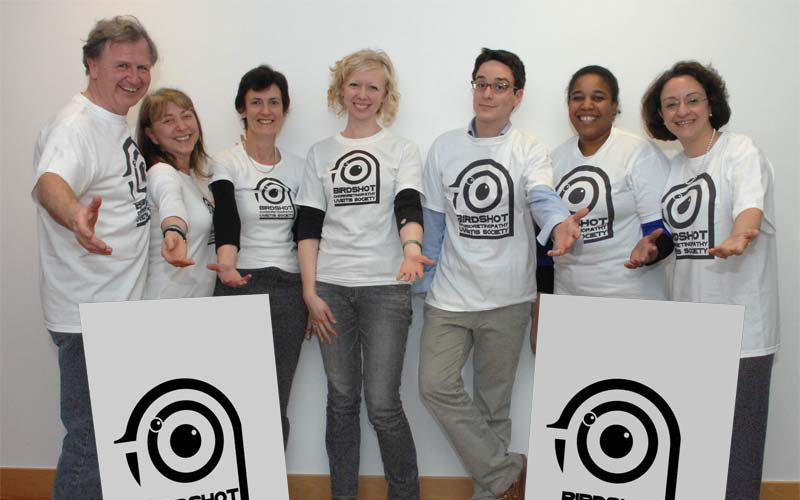Following receipt of the largest number of applications in the past four years, UCL Engagement is funding 12 projects from across UCL that will engage with public groups as part of research and teaching. The projects represent different methods of engagement; from using art-based practices to co-create knowledge, to participatory workshops and place-based intervention. In all cases these projects are bringing people together to exchange knowledge, skills and perspectives.
The successful projects are working with communities across London, the UK and beyond, many of whom are not often heard in academia. Over the year, UCL Engagement will support these projects, ensuring that learning is captured along with beneficial impacts on both research and teaching within UCL and on the people and communities we engage with.
This year saw many postgraduate students both applying for and being awarded a Beacon Bursary. This enthusiasm from those starting out on their research careers helps make a reality of UCL Engagement's ambitions to enable brighter ideas through deeper connections.
Below are our projects. For additional information, please contact UCL Engagement on publicengagement@ucl.ac.uk
- Trust in Pictures: Co-creating a children’s book as a site for research engagement with care-experienced children, young people, and foster carer
Eva Sprecher, Postgraduate Research Student & Research Fellow Department of Clinical, Educational and Health Psychology
Most research concerning children, young people and their caregivers is designed, conducted, and disseminated in ways that are inaccessible for these groups to meaningfully engage with and bring into their lived caregiving relationships. . This project will bring together researchers with interest in trust (specifically ‘epistemeic trust’) in relationships with the experienced of foster carers and care-experienced young people to create an illustrated children’s book. This project will help stimulate discussions about trust in foster care relationships and ultimately create a resource that empowers children living in care, foster carers and social work professionals to engage with research about trust in foster care.
- How to actively include people experiencing socioeconomic deprivation in research from participation to dissemination
Abi Woodard, Research Assistant, Primary Care and Population Health
Megan Armstrong, Senior Research Fellow, Primary Care and Population Health
People experiencing socioeconomic deprivation have lower inclusion in research despite having worse health outcomes, such as increased multimorbidity risk. The project will engage with people experiencing socioeconomic deprivation who have long-term health conditions, to explore the barriers and enablers to participation in research, whilst highlighting the benefits of research involvement. We will do this through two participatory workshops. These will explore pre-conceptions surrounding what research entails, by identifying the barriers associated with engagement in research activities among this population. We will also explore how to disseminate health research in creative ways and co-produce a visual output with an aim to reach underserved groups and different communities of practice.
- Co-creating balance exercises with people who live with Charcot Marie Tooth Disease
Louie Lee, Postgraduate Research Student, Department of Neuromuscular Diseases
People with Charcot-Marie Tooth Disease (CMT) experience poorer balance than the general population. This can lead to falls and a reduced ability to participate in the things that are important to them. Multi-sensory balance exercises have been helpful for people with other conditions, and our early studies show promising results in people with CMT. In this project we will work with people who live with this condition to co-create a new, mixed ability, balance exercise programme. In the second stage of the project, an East London artist will help the participants to design an illustrated exercise booklet describing the exercises.
- Thinking With Our Hands – Pensando Con Nuestras Manos
Javiera Sandoval Limarí, Postgraduate Research Student & Teaching Assistant, Culture, Communication and Media, IOE, UCL's Faculty of Education and Society
This project connects UCL with AMPLA, a grassroots organisation of migrant women and mothers from Latin America, and Gasworks, a non-profit contemporary arts organisation. The project will mobilise art engagement as a research methodology. It will do so through a series of workshops exploring clay modelling, which aim to create spaces for Latin American women to think together, connect as a community, and collectively explore their identities and experiences of migrant womanhood and motherhood, support their wellbeing, and share their voices with the city we inhabit. The knowledge produced and the voices of participants will be disseminated through a zine collaboratively written which will be distributed both physically and digitally through social media.
- ‘First do no harm’: Understanding health and social care service harms from a survivor perspective
Claire Powell, Senior Research Fellow, Institute of Child Health
We will consult adult survivors of violence and abuse on their experiences of harms within health and social care services. This is building on a study of outcomes for interventions for child maltreatment and domestic violence in which survivors identified service harms as an area for further work. Through workshops with survivors we will co-produce a digital resource to facilitate ‘harm-awareness’ in services that will support service providers to work towards reducing the re-traumatisation of survivors. The aim of the digital resource is to make the findings accessible beyond academic publications and to raise awareness of harms in service settings.
- Time to look again at HIV and relationships
Tom Witney, Research Fellow, Primary Care and Population Health
Although 20% of people living with HIV in the UK have an HIV negative partner, mixed-HIV status relationships are often ‘invisible’. This contributes to the persistence of HIV stigma, which continues to have a significant impact on people living with the virus, and those around them. The aim of this project is to make mixed-HIV status relationships visible and address HIV stigma by mobilising the findings of recently completed PhD research to co-create a ‘guide’ to HIV and relationships that will challenge public attitudes and support people in mixed-HIV status relationships. The project will work with Positive East, a community support organisation based in east London that has worked to improve the quality of life of individuals and communities affected by HIV for more than 30 years.
- Violence against women and girls: is history repeating itself? An exploration of the resonance of early feminist Christine de Pizan’s works among 21st century women and women’s community organisations
Cleo Fatoorehchi, Postgraduate Taught Student, UCL History
Jane Gilbert, Professor of Medieval Literature and Critical Theory, SELCS-Centre for Multidisciplinary and Intercultural Inquiry
This project will raise awareness of the late medieval female writer Christine de Pizan, who was the first professional writer in vernacular French, as an early feminist writer, while exploring whether her works can inform thinking about feminism today. Through a participatory workshop, we will introduce Christine de Pizan to women attached to the Feminist Library, an autonomous community space based in south London. Bringing together academic researchers with grassroots organisations as well as interested individuals, we will discuss the relevance of Christine’s pre-modern thinking for post-modern women, particularly in the context of fighting against violence against women and girls – a subject as important in the 15th century as it is today.
- ‘At home at school?’ School experiences of young people in contexts of inequality. The role of sociological perspectives and creative (research) methods.
Sara Bragg, Lecturer, Education, Practice and Society, IOE, UCL's Faculty of Education and Society
This project will co-produce new knowledge about (in)equalities in school, working with a local campaign group Class Divide and young people aged 11-18 from East Brighton, an area of high poverty and low educational attainment. The project will run creative workshops to gather accounts of young people’s school experiences, connect these to sociological research, and present the outcomes in accessible multi-media forms to wider audiences including local parents, schools and policy makers. It hopes thereby to help schools become more welcoming environments for young people from disadvantaged communities. The workshop materials and approaches will be made available for re-use in other communities and contexts.
- Not Just Beauty: Using Beauty Salons to raise awareness of gender equality among South Asian Migrant Women
Nandita Dutta, Postgraduate Research Student, SELCS-Centre for Multidisciplinary and Intercultural Inquiry
The aim of this public engagement project is twofold: first, to equip South Asian beauty salon workers with conceptual knowledge about issues related to gender, gender-based discrimination, and sexual and reproductive health so that they can provide appropriate guidance and signposting to their customers; second, to co-produce with them concrete recommendations on how local organisations and charities can engage beauty salon workers in order to reach out to communities of first-generation migrant women from South Asia. This will be achieved through a series of consultative workshops to be organised in two beauty salons in London where salon workers as well as customers are first-generation migrant women from Afghanistan, India, Nepal and Pakistan. - Improving emotional wellbeing through the senses for people living with dementia in Waltham Forest
Danielle Nimmons, NIHR In-Practice Fellow, Research Fellow, Primary Care and Population Health
Narin Aker, NIHR SPCR PhD student, Primary Care and Population Health
Pushpa Nair, NIHR In-Practice Fellow, Research Fellow, Primary Care and Population Health
Poor emotional wellbeing is common in people living with dementia and is associated with poor physical health. The COVID-19 pandemic has further impacted on wellbeing for people living with dementia, for example, due to reduced social interactions. This project aligns with our research in mental health and dementia in diverse populations. We will conduct four workshops with people living with dementia and their carers from diverse ethnic backgrounds in Waltham Forest to raise awareness and explore how the senses can be utilised to improve emotional wellbeing. We will share our research findings, while informing future research and public engagement activities.
- Block to Block
Claire McAndrew, Co-Director of AUAR (Automated Architecture) Labs at The Bartlett School of Architecture.
Mollie Claypool, Co-Director of AUAR (Automated Architecture) Labs at The Bartlett School of Architecture.
Melissa Mean
This project builds upon partnerships that were formed via a process of engaged scholarship in Knowle West, Bristol during Spring 2020 through a circular economy initiative. It makes use of circa 200 modular housing blocks from the recent projects Block West (Bristol, 2020) and House Block (Hackney, 2021). Seeding a community-led initiative that redistributes the blocks for meanwhile use, it seeks to broaden the reach of hands-on engagement with alternative modes of housing production within Knowle West.
- Understanding and facilitating mental health self-management amongst LGBTQI+ young people in the community
Rosa Town, Postgraduate Research Student, Research Department of Clinical, Educational and Health Psychology
This co-produced event and resulting video will be an opportunity to exchange knowledge with LGBTQI+ young people in the UK about the mental health self-management strategies they and others have found useful, drawing on the findings of my PhD so far. During the event, the Anna Freud National Centre for Children and Families’ LGBTQI+ mental health booklet and ‘On My Mind’ self-care resources will be shared to support participants. A discussion will be facilitated regarding participants' experiences of using self-management resources and strategies. Finally, a short video will be co-designed with a sub-set of participants to share LGBTQI+ mental health self-management experiences and strategies more broadly.
Further Information on UCL Engagement:
- UCL Engagement takes a collaborative approach to enabling brighter ideas through deeper connections. We focus on equipping UCL to listen and respond to community need, locally and globally. We spark ideas of how drawing on community-based experience and assets can lead to collaborative success in solving challenges and creating positive change together. We expand the conversations which inform UCL’s research and teaching, particularly to include those whose voices are heard less often or have been drowned out in the past. Importantly, we are committed to sharing what we learn about how to work with others to achieve more with government (national and local), UKRI and other funders, the Higher Education sector and beyond.
- UCL Engagement is based in the Office of the UCL Vice-Provost, Research, Innovation & Global Engagement (OVPRIGE) within Library, Culture, Collections & Open Science (LCCOS).
- The Beacon Bursary funding round is also support by UCL East’s Community Engagement programme supporting projects taking place in east London.
- UCL Engagement was established in 2008 as the Public Engagement Unit. Since then, UCL Engagement has awarded over £275,000 of funding to 164 projects through the Beacon Bursary scheme.
 Close
Close




